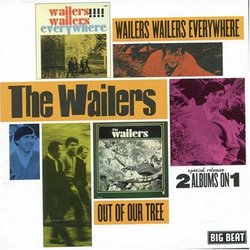Powerhouse Northwest rock two-fer
hyperbolium | Earth, USA | 12/26/2004
(5 out of 5 stars)
"By 1964 The Wailers had established themselves as one of the Pacific Northwest's most powerful rock 'n' roll bands; but as they entered the studio (Coast Recorders in San Francisco, home to Sly Stone and Autumn Records, among others) late that year, there was change in the air. The Beatles had already led the charge on American shores, and the resulting "Wailers Wailers Everywhere" reflected the influence of British Invasion bands, as well as American harmony groups like The Beach Boys.
While many dismiss the album as a canny misfire, the Wailers' turn from all out frat rock was far from a failure. In addition to strong R&B tracks like the bluesy instrumental "The Wailer" and the frenetic "Just a Little Bit Louder," the band introduced original folk-rock tunes like "Tomorrow's Another Day," showing off harmonies that compare favorably to The Rockin' Berries and Tokens. Covers of "Do You Wanna Dance?" and "Ya Ya," along with the original "Since You Been Gone" would surely have gotten the Alpha's and Delta's onto the dance floor. The album's weakest tracks are the faux Merseybeat tunes, which sound like album sides from the Dave Clark Five.
The followup LP, "Out of Our Tree," marked a return to the savage rock 'n' roll upon which The Wailers minted their legend. The title track is one of the band's best, and the remainder of the album is filled out with R&B covers ("Mercy Mercy" "Baby Don't You Do It" "Little Sister" "Bama Lama Bama Loo") and pop hits reworked to the Wailers raw style ("Hang On Sloopy" "I'm Down"). Even The Righteous Brothers "Unchained Melody" can't escape the Wailers touch, with thundering bass and ringing organ underlying the vocal. The remaining originals include a rehash of their signature "Dirty Robber" and the menacing buzzsaw guitar of "Hang Up."
Big Beat's CD reissue adds five bonus tracks to the two albums' original 24 tracks, four of which are superb R&B rockers, and the fifth a Beach Boys influenced ballad (with a guitar figure copped closely from "Don't Worry Baby"). All in all this is a fantastic package, providing a look at the adrenal roots of the Wailers fame and the folk-rock direction they would move on to with 1966's "Outburst" for United Artists. One downer for anyone over 30: Alec Palao's excellent liner notes are printed in almost unreadably small type; make sure to bring a magnifying glass or bifocals!"


 Track Listings (29) - Disc #1
Track Listings (29) - Disc #1